Hurricane Katrina and the Escalating Impact of Climate Change
In just this small area of about 5 or 6 city blocks, there are right now about 19 or 20 deaths in just that small area. That's me as a young blogger covering the most destructive hurricane in US history. Katrina caused more than $200 billion in damage and killed nearly 1400 people. And in the two decades since, our oceans have gotten even hotter as a result of burning oil and gas.

Illustration showing the rise in ocean temperatures since 2005, fueling stronger hurricanes.
This illustration shows how fast ocean temperatures are rising nearly a full degree hotter since 2005, which is a big deal because heat is what fuels hurricanes. And unfortunately, yes, there is more of that jet fuel that these systems, tropical cyclones can tap into. And lead to rapid intensification. When a storm's winds increase 35 miles an hour in less than 24 hours, that's rapid intensification, and that's happening more often, but so is an even newer term extreme rapid intensification.
But look at what Milton did 92 mile an hour increase, and that is one of the hallmark signatures of what climate change is doing to hurricanes. Sally. Well, climate central analysis found that since Hurricane Katrina, extreme rapid intensification is happening nearly 50% more often and if that intensification occurs near land, it basically cuts off any lead time and leads a community leads to a community being in many cases unprepared.
And that's why investments in hurricane research are so important, helping forecasters at the National Hurricane Center keep pace with how an overheating planet makes storms more intense and wetter too. Every hurricane contains more moisture than it would have without climate change, and that means the rainfall associated is in every case stronger than it would have been. And so the flood damage from hurricanes is larger because of climate change. Numerous studies show that link.
Researchers found Hurricane Helene dumped 10% more rain because of climate change, 18% more rain from Hurricane Ian, and up to 36% more rain during Hurricane Harvey, likely flooding twice as many homes because of climate change. And looking back to Katrina, Climate Central found the water which fuelled the storm was even at the time, 5 times more likely to be that hot because of climate change.
Fast forward to today and the Gulf is even hotter. Folks need to realize that the 21st century climate and the type of weather extremes that we're seeing in the 21st century climate are nothing like we've lived through before. People need to be ready for these extremes and think more often than not, that if there's a chance for something bad happening, yeah, it's a much bigger chance than it was in the 20th century.


0 Comments